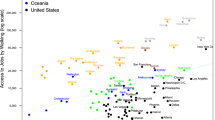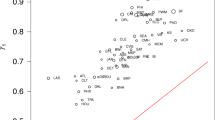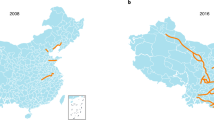Abstract
IN NATURE of December 19, 1901 (p. 149) is given a criticism of a work, in which some essential points in the making and maintenance of roads are strongly insisted on. At p. 156 of the same number there appears an excellent commentary on Mr. Balfour's speech to the students of the Goldsmiths' Institute at New Cross on December 12. With your comments I am in thorough sympathy, and would beg leave to point out that the two subjects are far more closely connected than might at first appear. Excellence and superiority in manufactures and commerce depends on very many elements, as you know, one of the most important of which is the “item” “carriage or transport.” British superiority in many manufactures and markets has depended, and will henceforth largely depend, on that one item principally (take the case of iron ores), and to maintain superiority it must receive in the immediate future more careful attention and scientific treatment. Roads in their different forms enter largely as factors into the general question of “transport,” and if trade superiority is to be maintained they must be looked after and treated, all over these countries, in a more scientific and skilled manner than that now prevalent in the United Kingdom. For that end there must be attained, as soon as possible, uniformity of make, treatment and control, and the highest efficiency as regards care and maintenance, and to ensure these results they should be placed under the charge of a body of trained engineers, such as those of the “ponts et chaussées” of France. The question to a certain extent resembles that of the currency of the realm, and as there is a perfectly uniform coinage for every part of it, so should the make and use of the roads be of one standard all over the kingdom, in the best interests of all who travel or convey goods. The Board of Trade controls the railways, why not a Board or Department for the roads? and thus obviate the many absurd and scandalous practices which exist and are allowed to prevail, to the great discomfort and loss of the community. Allow me to give my experience of what is taking place in the township of Pembroke (Dublin). The road “metal” mostly in use is simply the coarser riddlings from the drift gravel so abundantly and cheaply worked in the neighbourhood of the Town Hall. The stones, perfectly rounded, incapable of taking bond and largely composed of entirely rotten elements, are loosely thrown here and there, where prominent holes appear. Mr. Beete Jukes, the former head of the Geological Survey of Ireland, remarked when he saw the material used, that boiled potatoes might as well be employed, and the rapid wear fully bears out the correctness of this judgment, and hence a large staff of scavengers and carts, discomfort for all classes of road-users, and steady increase of rates. In a southern county I have seen the road surface worn into the form of the section of an inverted arch, and was informed by a competent authority that the county surveyor, a Whitworth scholar, secured the place as the result of a Civil Service examination, the pay being about 800l. per annum, and thus secured, proceeded to develop a private practice as civil engineer, leaving the roads to attend to themselves. Many other examples of this nature might be given. As to the importance of good roads from a military point of view, it should be unnecessary for me to refer to it. I see from time to time the Dublin garrison companies and battalions out on marching exercise and notice the draggled appearance in which the men come home when the weather is in any way moist or rainy, and reasonably associate this condition with the bad state of the roads about Dublin. The Romans certainly knew better on this branch of military engineering, and might still be copied. As for agriculture, the Americans have gone thoroughly and systematically into the question, and are taking effective measures to put their road systems into a proper working state, and to have them kept up to it. I trust, Sir, that you will excuse these rather extended observations and that you will see your way to urging the pressing importance of a uniform and general system of road making and maintenance for the kingdom on the grounds of high State utility, commercial importance and agricultural necessity.
This is a preview of subscription content, access via your institution
Access options
Subscribe to this journal
Receive 51 print issues and online access
$199.00 per year
only $3.90 per issue
Buy this article
- Purchase on Springer Link
- Instant access to full article PDF
Prices may be subject to local taxes which are calculated during checkout
Similar content being viewed by others
Author information
Authors and Affiliations
Rights and permissions
About this article
Cite this article
O'REILLY, J. Roads and National Welfare. Nature 65, 222–223 (1902). https://doi.org/10.1038/065222e0
Issue Date:
DOI: https://doi.org/10.1038/065222e0
Comments
By submitting a comment you agree to abide by our Terms and Community Guidelines. If you find something abusive or that does not comply with our terms or guidelines please flag it as inappropriate.



